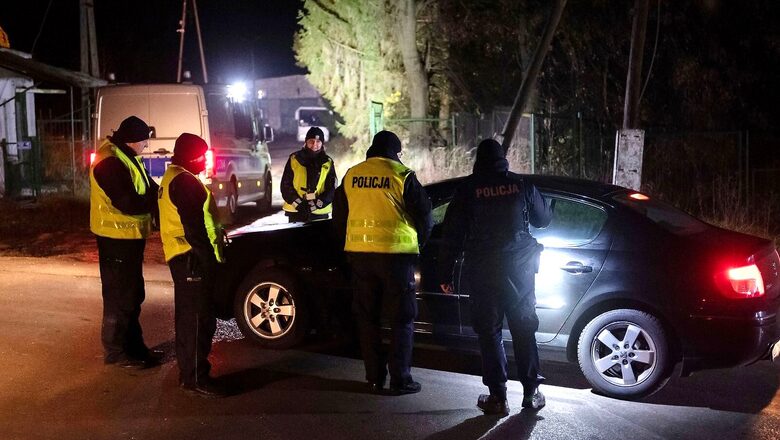World War III After Missile Strike in Poland? What Action NATO Can Take 'Against Russia' | Explained

views
US President Joe Biden and leaders of key allies held “emergency” talks Wednesday after a missile hit Polish territory near the border with Ukraine, the White House said. While Poland had said that the missile that killed two was Russian-made, Biden said it was “unlikely” it was fired from Russia.
The Associated Press quoted US officials as saying that initial findings suggested the missile that hit Poland was fired by Ukrainian forces at an incoming Russian missile. The officials spoke on condition of anonymity because they were not authorized to discuss the matter publicly.
Amid the development, the world watched keenly, as it was the kind of scenario that elicits nightmares: Russia being ‘responsible’ for civilians killed in a NATO member country, sparking an escalation spiral that leads to World War III. However, the chances of this tragedy sparking a nuclear war are extremely remote. Even NATO’s most anti-Russian members will be hesitant to allow this to be the tipping point in the war against Moscow.
First, let’s understand what NATO is:
The North Atlantic Treaty Organization, also known as the North Atlantic Alliance, is a military alliance of 30 member countries, 28 European and two North American. The organisation was formed in the aftermath of World War II to carry out the North Atlantic Treaty, which was signed in Washington, on April 4, 1949.
Spoke with President Duda @prezydentpl about the explosion in #Poland. I offered my condolences for the loss of life. #NATO is monitoring the situation and Allies are closely consulting. Important that all facts are established.— Jens Stoltenberg (@jensstoltenberg) November 15, 2022
NATO is a collective security system in which its independent member states agree to defend one another against third-party attacks. NATO served as a check on the perceived threat posed by the Soviet Union during the Cold War. After the dissolution of the Soviet Union, the alliance remained in place and has been involved in military operations in the Balkans, the Middle East, South Asia, and Africa.
Article 5 of the NATO Treaty
The main reason for concern about an escalation is Article V of NATO’s founding treaty, a clause that has only been invoked once — after the 2001 terrorist attacks on the United States. NATO members “agree that an armed attack against one or more of them in Europe or North America shall be considered an attack against them all,” according to Article V. In such a case, NATO members must assist that ally by taking “such action as it deems necessary, including the use of armed force,” a report by MNSCBC explains.
But that’s unlikely. Why?
For starters, neither US nor Polish officials are eager to make this a bigger crisis than it needs to be, the MNSCBC reports. The US National Security Council and the Pentagon both stressed that there is still a lot we don’t know and that the origins of the blast in eastern Poland are still being investigated. On Twitter, Polish government spokesperson Piotr Müller stated that Prime Minister Mateusz Morawiecki had called an emergency meeting of national security and defence advisers and urged people not to spread unverified information.
NATO normally acts only by consensus, which means that all 30 members must agree. To get those countries to agree on something as important as invoking Article V, a much clearer indication that the attack on Poland was deliberate would be required.
To that end, Poland announced on Tuesday that it would invoke Article IV of NATO’s charter, convening allies for consultations on next steps, reports said. President Joe Biden and US National Security Adviser Jake Sullivan have already spoken on the phone with their Polish counterparts.
What is Article 4?
The article allows NATO members to bring any issue of concern, particularly security, to the North Atlantic Council for discussion, VOA explains in a report. Article 4 does not imply that there will be immediate pressure to act.
Article 4 allows any member state to call a meeting of NATO members to “consult” if it believes its independence or security is under threat. It has rarely been used in practise, but it sends a strong message to the rest of the world that NATO is concerned about the situation.
According to The Washington Post, NATO has used Article 4 seven times since its inception in 1949. It was recently invoked by Latvia, Lithuania, Poland, Bulgaria, the Czech Republic, Estonia, Romania, and Slovakia to hold consultations regarding Russia’s invasion of Ukraine.
In 2015, Turkey invoked Article 4 after a suicide bombing on its border with Syria killed approximately 30 people. NATO then issued a strong condemnation, but that was about it.
What Have Russia and US Said?
The Russian Defense Ministry denied responsibility for “any strikes near the Ukrainian-Polish border” and stated that photos of alleged damage “have nothing to do” with Russian weapons.
The strike was revealed as Russia pounded Ukraine’s energy facilities with its most powerful missile barrage yet, hitting targets across the country and causing widespread blackouts. The barrage also had an impact on neighbouring Moldova. An official said the strikes knocked out a key power line that supplies the small nation, causing massive power outages.
President Biden, who is in Bali for the G20 summit, has promised “full US support for and assistance with Poland’s investigation,” as well as “reaffirmed the US’ ironclad commitment to NATO,” according to the Associated Press.
Read all the Latest Explainers here


















Comments
0 comment